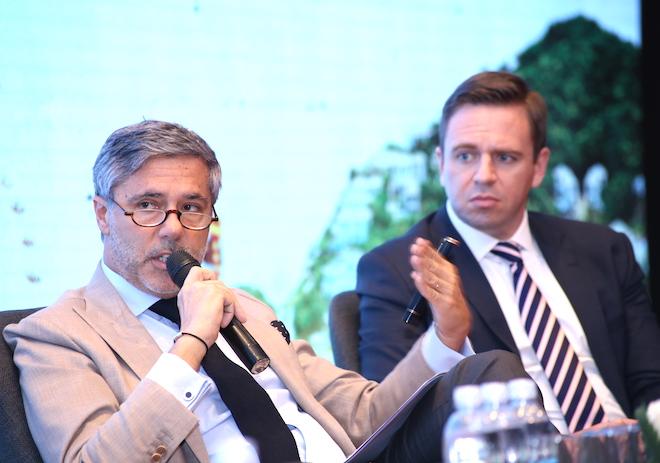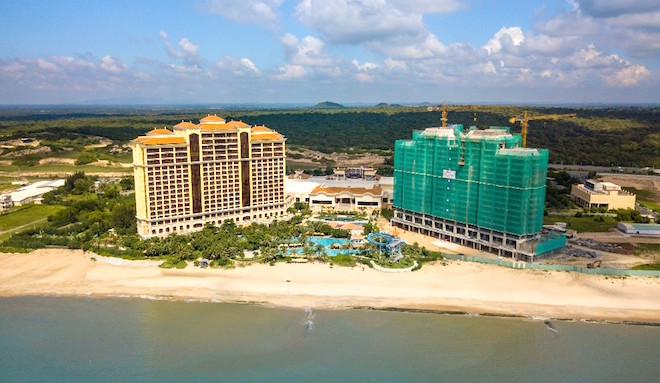The term Integrated Resort (IR) is used to describe a complex resort property that provides a diversified leisure offering including, amongst others, hotel, casino, convention & exhibition facilities, entertainment, retail, fine dining.
The IR concept goes back to the 90s to address the new developments that surfaced in Las Vegas, like the MGM Grand or the Venetian Las Vegas (the first Las Vegas mega resort was the Mirage which opened in 1989) which were followed by a number of similar size complexes across the Strip.
All have the same characteristics, but different offerings ranging from huge hotels (3,000 – 4,000 rooms) to entertainment facilities hosting world class shows, sports arenas, theme parks, night-life venues, etc., all under one roof and catering for tourists as a complete and diversified tourism destination.
Gaming has been an integral part of the IR concept since its origins. There is one very simple explanation for this integration of gaming within the IR concept: considering the huge investment that these sheer scale developments require, the same can only be efficiently underwrite by adding gaming tables and pursuing gaming revenue as an important part of the return on investment.
Just to leave a rough idea of the investment size, the Venetian Macau Resort Hotel, in Macau, costed around $3 billion and the Marina Bay Sands in Singapore around $5 billion.

Luis Mesquita de Melo talked during the panel discussion at Vietnam Tourism Property Forum 2019 held by TheLEADER last week.
The main characteristic of the IR model is that fully integrates gaming as part of an entertainment offer and attracts, side to side, very diverse foreign tourists with an important focus on families, business travelers (mainly on the conventions and exhibitions segment) and, generally, non-gamers as well as the so called high-rollers or VIP players.
The IR model represented a big change from the old-style Freeman Street casinos in Las Vegas or the Lisboa Casino in Macau in the 80s and 90s which were hardcore gaming hubs without any other entertainment offers on the menu.
Macau has since then evolved to a Las Vegas style IR model with the opening of the gaming market in 2001 by attracting some of the Las Vegas operators – Las Vegas Sands, Wynn, MGM – which have built in Macau replicas (much larger though) of their Las Vegas properties and has even adopted the Strip concept by concentrating the biggest of these mega resorts along the Cotai Strip in a new development area similar to the Las Vegas Strip.
As someone as put it in a very elucidative way: “Integrated resorts all have one common ingredient that makes them function so uniquely – a casino”.
The balance between gaming and entertainment or gaming as entertainment
As gaming became part of the IR model, what we have seen is a more balanced combination between gaming and non-gaming revenues. That has always been a major highlight of the Las Vegas market that was always very proud of combining gaming and non-gaming revenues in an almost perfect 50/50 proportion.
Macau, that moved into the IR model in 2001, and came out of a monopoly situation built around hardcore standalone casinos, fueled by the never ending Chinese market spreading from its doorstep, saw initially a very big component of gaming revenues – and specially based on the VIP segment – but now is seeing an adjustment to a more suitable proportion between gaming and non-gaming and the VIP weight on the Gross Gaming Revenue (GGR) has definitely decreased over the years.
The Macau Government has made it very clear that moving forward gaming operators will need to invest more on non-gaming infrastructures and offerings to help develop a tourism destination beyond gambling. It will be interesting to see how this approach will play out on the new gaming concessions award process that will take place in 2022 for all the six gaming operators.
How does the IR model contribute to public policy
First of all, the IR model, if implemented properly will definitely contribute to create a tourism destination. It will attract tourists and it will make the length of stay longer as a result of the ample and diverse entertainment offerings at play.
It will also play an important role in adding to the conventions and exhibitions market which will attract business traveler and corporate executives creating on its own a MICE (Meetings Incentives Conventions and Exhibitions) market which is undoubtedly a rising start when it comes to a very profitable international and national forms of tourism. Around 6 million MICE participants visit Las Vegas on a yearly basis and around 2.5 million visit Macau.
In addition, the IR model creates employment and increases tax revenues. From the construction stages to the operations phase, these mega resorts employ thousands of employees and provide huge tax revenues for the respective governments. Gaming taxes have always been a driver behind the implementation of the IR model and if they are set at the maximum efficiency point, they will not only provide a steady revenue stream for governments but will also allow further investment and development by the gaming and resort operators.
As a result of their largescale operations, IRs have a multiplier effect in national and local economies as they drive a significant amount of new business from consultants to suppliers, contractors, travel agencies, and also inject new money into the economy through their employees increased spending.
Finally, considering the investment required, most of the IR developments will see partnerships between foreign and local investors, and the addition to the country’s available resources and know-how of new skills and expertise in the hospitality and gaming industries and will, as well, trigger a step forward in local and regional infrastructures such as transportation, energy and roads.

Ho Tram Strip is one of the first integrated resorts in Vietnam.
How can we make the IR model work
There is obviously a business case that needs to be built in support of the IR model that takes in consideration all that we said above, e.g. the economic advantages, public policies benefits in terms of investment, employment, taxes, tourism projections, etc., but, overall, we also need to understand the underlying legal and regulatory requirements which are fundamental in determining investors’ confidence and operational certainty.
The IR model will not work if there is no legal and regulatory framework that recognizes the specificities of the IR model and addresses the development and operational requirements in line with the industry and international standards.
These requirements would be, at minimum, the following:
- The definition of an IR model policy that takes in consideration the appropriate percentage of facilities dedicated to gaming and non-gaming business scopes;
- Understanding the full meaning of integrating gaming in the overall IR entertainment offer and legislate to that effect by imposing non-gaming investment obligations;
- Understanding the necessity of a partnership model between the investors and the government underlying the investment efforts which also assumes that the government has an obligation to make the project successful and not only the right to increased tax revenues, job creation and economic development at the cost and sole responsibility of the investor;
- A proper gaming legislation addressing very standard requisites such as:
Gaming tax specific rules and regulations. There should be a special set of rules for the gaming industry that addresses very particular forms of revenue and losses linked with the operation of casinos which include, amongst others, the specific nature of gaming promotion services provided by the International Tour Operators (“ITO”s in bringing foreign players, the difficulties in collecting gaming debts, the concurrently taxation of other forms of corporate revenue ancillary to the gaming industry);
ITOs. It is fundamental to address the specific nature of gaming promotion activities through a special set of rules containing the licensing regime applicable to the ITOs.
Gaming credit law. It is very important to issues specific rules concerning the gaming credit in order to allow proper enforcement of gaming debts.
Electronic gaming machines manufacturers approval process. In order to ensure the integrity of the electronic gaming machines (slot machines) it is critical to have a set of rules concerning the approval of gaming manufacturers and the approval of electronic gaming machines and related equipment and gaming systems being supplied to the Vietnam market.
Responsible Gaming. Responsible Gaming programs are growing in importance and constitute, today, a major milestone in developing the gaming industry towards a truly entertainment environment.
Casino Games of Fortune Operational Rules. Each of the casino games of fortune or games of other forms is subject to a specific set of operational rules. The operating rules for the casino games of fortune are approved the Government upon proposal by the gaming regulator.
Anti-Money Laundering Regulations. Growing in importance worldwide and within the gaming industry as well are the anti-money laundering provisions and internal controls requirements imposed on the day-to-day gaming operations.
Establishing a gaming regulator. In building a gaming industry framework and providing the structure for subsequent developments of the gaming legal regime, it is critical to establish a specific body, within the Government structure that should provide guidance and assistance to Government on the definition and execution of the economic policies for the operations of the casino games of fortune or other ways of gaming.
Advertising. A specific regime should be established for advertising gaming. To what extent is the advertising of gambling permitted in this jurisdiction. To the extent that advertising is permitted, how is it regulated? We believe that it is important to institute a regime that protects responsible gaming and imposes adequate responsibility in formulating the advertising message.
- Ensure the oversight of the project development and operations through a specific regulator to avoid the slowdown of administrative decisions split between a number of Ministries with contradicting interests and views;
- Hold the investors to the highest standards considering their expertise, know-how and capability to operate in accordance with international and industry standards, namely their experience in other more developed gaming jurisdictions;
- Put effort and expertise in ensuring legal certainty and a clear framework that investors can comply with by knowing the legal requirements and steps to achieve full legal compliance. This means going down the road of issuing adequate and technically sound legislation specific to the IR model instead of preferring discretionary administrative decisions that most of the time cannot be legally syndicated. This should not be a problem in Vietnam since being a civil law based legal system should mostly rely on the law codification;
- Research and learn with more developed legal systems and jurisdictions that have experienced and dealt with the IR model implementation. In today’s state of affairs there is clearly no need to reinvent the wheel.
Many of the long-standing gaming jurisdictions as well as the emerging gaming jurisdictions want an integrated resort just like the ones in Las Vegas, Singapore, and Macau. And we must not forget that investors will be looking at legal and regulatory controls and administrative efficiency, tax structure, government credibility and transparency to make timely decisions, the quality of infrastructures before they decide to invest millions or billions of dollars in Integrated Resorts.
| Luis Mesquita de Melo is vice president and chief legal officer of Asian Coast Development Limited. |


















